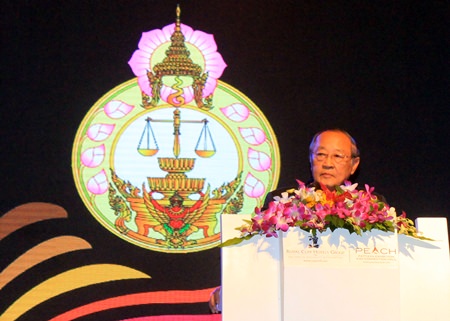More than 1,000 presiding and lay judges from juvenile and family courts across Thailand met in Pattaya to discuss ways to prevent young criminals from becoming repeat offenders.
Supreme Court President Direk Ingkaninanda presided over the July 23-24 academic conference at the Royal Cliff Hotel’s PEACH Convention Center.
Sumet Tantivetchakul, secretary of the Chaipattana Foundation, was the special guest lecturer, speaking on problem-solving, rehabilitation, and being a conciliator in cases relating to families to cooperate in helping youths to be reformed.
 Special guest lecturer Sumet Tantivetchakul, secretary of the Chaipattana Foundation, talks about problem-solving, rehabilitation, and being a conciliator in cases relating to families to cooperate in helping youths to be reformed.
Special guest lecturer Sumet Tantivetchakul, secretary of the Chaipattana Foundation, talks about problem-solving, rehabilitation, and being a conciliator in cases relating to families to cooperate in helping youths to be reformed.
Suphat Yuthanom, Chief Justice of the Central Juvenile and Family Court, told the group that, according to changes in the Juvenile and Family Court and Juvenile and Family Case Procedure Act, a key to ensuring youths don’t repeat their crimes is family. Youths, he pointed out, are out of the judicial system following their release and control over them reverts to parents.
Consequently, the courts must adjust and plan, with lay judges performing more roles instead of being a member of the justice system. For example, he said, they can be consultants, coordinating meetings on rehabilitation and integration plans, and being a conciliator in cases relating to family.
Moreover, it includes cooperation with other organizations to help children and youths be reformed and not to engage in delinquency again.




